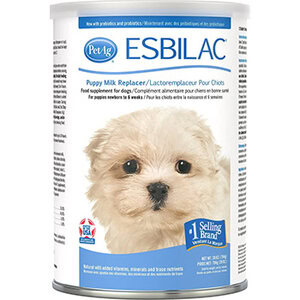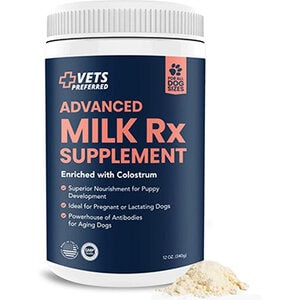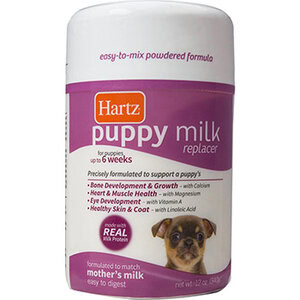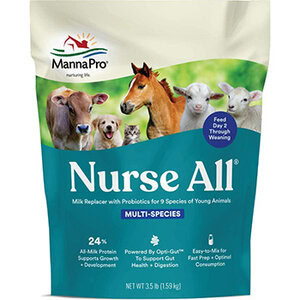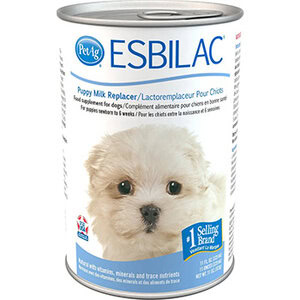This post may contain affiliate links. We may earn money or products from the companies mentioned in this post.
The best source of nourishment for young puppies is their mother’s milk, but it isn’t always possible to provide it to them.
Orphaned puppies, for example, aren’t able to suckle with their mothers, and mother dogs do not always produce enough milk to feed all of their puppies.
In this case, they need an alternative source of nourishment.
While a bowl of cow’s milk won’t do your puppy any harm, it doesn’t contain enough protein to be a replacement for mother’s milk.

Sheep and goat milk are better alternatives because they contain a lot more protein, but what’s even better is a milk replacement formula.
This tends to be more affordable, and the milk is reinforced with essential vitamins and minerals that young dogs need.
In this article, I will take you through the best milks for puppies and a few essential rules when feeding your young dog as an alternative to mother’s milk.
Product Quick Links
| Product | Features | Rating |
| PetAG Esbilac Powder Milk Supplement for Puppies |
|
|
| Vets Preferred Milk Replacement Formula |
|
|
| Hartz Powdered Milk Replacer Formula for Puppies |
|
|
| Mann Pro Nurse All Multi-Species Milk Replacer |
|
|
| PetAG Esbilac Liquid Milk Supplement for Puppies |
|
|
Composition Of Mother’s Milk
A mother dog’s milk is ideally composed to feed her young, growing puppies. Research suggests that 100 grams of dog milk contains around 23 grams dry matter, 9.5 grams fat, 7.5 grams protein, and 146 calories.
This is much more nutrient-rich than the types of milk that you will normally buy at the supermarket.
Whole cow’s milk contains only about 3.6 grams of protein and around the same amount of fat. Goat’s milk contains only a little bit more protein at around 4 grams per 100 grams.
Sheep’s milk is the most protein rich with 6 grams per 100 grams. All the milks are also lower in calories and fats.
Part of the reason for this is we harvest milk from cows continuously for several years. They are constantly impregnated by artificial insemination to ensure they are always able to produce milk.
Cows produce milk for about 10 months after giving birth.
This constant cycle and pressure on the body of the cow reduces the quality of the milk produced, which is why it is not as nutritious as the milk from a mother dog who breeds according to a more natural cycle.
To create milk substitutes that approach the nutritional value of mother’s milk, powdered milk products are made based on popular milks, such as cow’s or goat’s milk, and then reinforced with whey or casein protein powders, which are also derived from milk.
The formulas will also have added fats from natural sources. Fats are essential for growing puppies as they need the energy to support their rapid growth.
Powders will also be reinforced with a nutrient pack that contains essential vitamins and minerals such as calcium, phosphorus, selenium, and vitamins A, D, and E.
Best Puppy Milk Replacers
With these essential requirements in mind, below is a list of some of the best puppy milk replacers currently available. There are both powdered and liquid milk options.
They tend to contain the same essential ingredients, though powdered milk is much cheaper.
Liquid milk replacements are more ideal for traveling or other times when you may not have access to the facilities that you need to mix a powdered formula.
1. PetAG Esbilac Powder Milk Supplement For Puppies
PetAG produces the most trusted puppy milk brand on the market, and this is their leading formula. It is based on powdered cow’s milk but reinforced with whey and casein protein and added fats.
- Specifically for puppies
- Powdered cow’s milk with added protein powder
- 33% protein, 40% fat
- 50 calories per 100 grams
PetAG makes an excellent nutrient pack designed specifically for puppies that includes riboflavin, vitamin A, niacin, vitamin D3, calcium, zinc, vitamin B12, and more.
The formula should be mixed at a 1:2 ratio with water to produce 31.6 calories per tablespoon with 33% protein and 40% fat.
Pros: The high protein and fat content makes it ideal for growing puppies, and it comes in a concentrated formula, so they don’t need to consume huge amounts of it to get what they need.
Cons: PetAG offers some of the most expensive formulas on the market, but this is due to quality and brand recognition.
Puppies don’t necessarily like suckling when it isn’t from their mother. A highly concentrated formula like this one can make it quicker and easier to feed them.
2. Vets Preferred Milk Replacement Formula
This formula is designed for puppies and lactating dogs that need a nutritional boost to feed their little brood. It is a protein powder formula with lots of healthy animal and vegetable fats added.
- For puppies and lactating dogs
- Powdered whey protein
- 33% protein and 40% fat
- 60 calories per 100 grams
The formula is made principally from whey protein, which is a great source of energy and tissue building matter for growing dogs.
The backup vitamin pack is also comprehensive with calcium, magnesium, iron, zinc, copper, and vitamins A, D3, and B12.
Pros: The formula is high in protein and fat and an excellent nutrient pack that ensures your puppy isn’t missing anything important in their formative growing years.
Cons: It is a protein powder and feels less natural than a milk powder. It may be better as a supplement than an alternative milk supply.
If you are looking for a formula that is ideal to both help a lactating mother and feed puppies from a large litter struggling to get enough nutrients, then this is a great choice.
3. Hartz Powdered Milk Replacer Formula For Puppies
Hartz offers one of the most affordable milk supplements on the market that still meets the high standards required for taking care of newborn puppies.
- Specifically for puppies
- Powdered whey protein
- 31% protein and 46% fat
- 55 calories per 100 grams
This formula is principally derived from whey protein (which is why it is so high in protein) and also various types of fats.
Both animal and vegetable fat have been added to the formula. While 46% fat might seem high, it is essential to give dogs the energy they need to grow and maintain their body temperature as puppies.
Plus, it is still significantly less than the amount of fat found naturally in mother’s milk.
The high fat content means this is a great option for runts of the litter that need fattening up. The formula can be mixed at room temperature, which makes it easy to prepare.
Pros: This formula is affordable and can be mixed at room temperature, which makes it cheaper, more accessible, and easier to prepare than some of its competitors.
Cons: The high fat content means you will need to monitor your puppy carefully on this diet.
If you need an affordable but good quality formula and you want something that is easy to prepare, then Hartz has come up with a formula ideal for giving smaller puppies a growth boost.
4. Mann Pro Nurse All Multi-Species Milk Replacer
This milk powder is actually formulated for a variety of young animals including calves, foals, goat kids, lambs, and piglets as well as kittens and puppies.
- Ideal for a variety of young animals
- Powdered whey protein
- 24% protein and 24% fat
While it may seem disconcerting that this formula is not specifically designed for puppies, baby animals that feed on mother’s milk all have similar needs.
One thing that stands out about this formula is that it includes bacteria to help form the right kind of gut bacteria for your dog. This is important, as worms are a common and often constant issue with puppies.
Pros: This formula is affordable and has added ingredients that help puppies develop a good gut bacteria ecosystem, substituting bacteria they should be getting from mother’s milk.
Cons: This formula is not specifically designed for dogs, and so it has a slightly lower protein and fat content than competitors.
If you want to set your dog up to have a healthy gut for the rest of their life, filling them with good gut bacteria as a puppy with this formula is a great place to start.
5. PetAG Esbilac Liquid Milk Supplement For Puppies
Liquid formulas contain more or less the same ingredients as powdered formulas, but they are also more expensive than most powdered options.
Nevertheless, they can still be a good option when you don’t have access to the facilities that you need to mix powdered milk.
- Specifically for puppies
- Liquid skim milk and caseinate protein
- 4.5% protein and 6% fat
- 881 calories per kg
Since this is a liquid formula, it has a lower concentration of protein and fat, with just 4.5% of protein and 6% fat.
This is lower than mother’s milk, so the formula is best used as a convenient supplement when necessary rather than as the main source of nutrients for growing puppies.
It contains the same great vitamin pack as all PetAG milk replacer products.
Pros: This formula is convenient and can be the best way to feed your puppy when you are on the road or traveling.
Cons: Liquid milk replacer is more expensive than powdered milk replacer. It is also lower in essential protein and is therefore best used as a supplemental backup rather than a primary source of nutrients.
If you want something convenient to feed your puppy while they don’t have access to mother’s milk or powdered formula, then this is the best liquid milk replacer on the market.
Puppy Milk Buying Guide
When you are choosing the right milk replacer to be feeding your puppy, there are a few important factors to consider, such as the formula’s nutritional contents, its fat content, and the specific type of formula that works best for your situation.
What Type Of Formula Does Your Puppy Need?
One thing you should bear in mind is whether your puppy will be feeding exclusively on milk replacer or if they are still feeding from their mother and you are using the replacer when they don’t have access to their mother or if their mother is not producing enough milk.
If it is just for the occasional feed, a liquid milk might be the most convenient solution, and it might also seem more natural to your dog who is used to the teat.
Alternatively, if you are trying to fatten up a runt that is being rejected by their mother or can’t compete with the rest of the litter, then a formula that is high in protein and fat is essential.
Formula Basis
Consider the primary basis of the formula that you are considering, which will probably be cow’s milk, goat’s milk, or a protein powder like whey powder that is derived from milk (usually cow’s milk).
All of these offer a good source of protein and calcium for your dog, and the right one can sometimes come down to personal preference.
Goat’s milk probably represents the most natural source, while whey protein will offer the highest protein input.
Protein Levels
While dog’s milk only contains around 7.5 grams of protein per 100 grams, you will find the protein and fat in milk replacers are much more concentrated.
This is because most puppies will probably be drinking less of it since it is not always easy to hand feed puppies.
As a general rule, you will want to choose something with 20% to 35% protein.
The exception would be if you are looking for something for the occasional feed when the puppy does not have access to their mother and you want something that more closely resembles their mother’s milk.
Fat Content
You will find that all milk replacers have added fat that will typically be listed on the milk’s packaging as animal and vegetable fat.
Unfortunately, more specific information is rarely provided by milk replacer manufacturers about the source of this fat.
Regardless, puppies need lots of fat to fuel their growth, so choose something with around 20% to 45% fat. Anything higher than that is not recommended
Nutrient Pack
All milk replacers (and, in fact, all dog foods) are reinforced with a nutrient pack to ensure they’re providing everything the dog needs to thrive.
This is important, as most dogs don’t have a varied diet, so they can often miss out on nutrients they would otherwise absorb in the wild.
Most manufacturers will highlight a few ingredients from their nutrient packs, which can contain scored or added extras.
The most important things to look out for when checking the ingredients list are calcium, copper, zinc, and vitamins A, D3, and B12.
Powdered vs. Liquid Milk Replacer
While liquid milk replacer might look and feel more natural, this is not necessarily the case!
They are made from the same protein powders just delivered to you in liquid form for convenience so you don’t have to mix the formula yourself. Also, liquid replacers tend to be lower in protein and fat.
When looking at powdered options, you will find that most require you to heat water to mix the formula.
There are also a few options out there that can be mixed at room temperature, and they can be just as convenient as liquid options.
When Do Puppies Need Milk?
Normally, when puppies are with their mother, they will nourish themselves exclusively on their mother’s milk for the first three to four weeks of life.
At this time, their teeth begin to grow in, and mothers start to pull away. They will be getting less milk, and solid foods can be added into their diet.
Puppy formula kibble should be softened with water when given to these puppies to make it easier to chew and digest.
They will probably continue to consume some milk until about six weeks of age and will be completely off milk by around seven to eight weeks.
If you are feeding your puppy milk replacer, they need to eat around 180ml of milk per kilogram of their body weight per day to replace what they should be getting from their mother.
If puppies are receiving their milk replacement in addition to mother’s milk, it can be harder to know exactly what nutrients they need.
Puppies will often cry if they aren’t getting enough milk. When they are getting enough milk, their rib cages should disappear from view, but their stomachs should tuck in rather than sag out.
You can read our guide to how much to feed a Labrador puppy here.
You can also read our guide to how exactly to bottle feed your puppy here.
The Verdict
If your puppy is not getting enough milk from their mother, you can’t just feed them with the milk you buy at the supermarket.
The mass-production market means that it is much less nutritious than the milk produced by a lactating mother dog. Fortunately, plenty of great options exist that are specifically formulated for puppies.
Remember these factors when deciding on the right kind of milk replacer for your puppy:
- The type of formula ideal for your situation, i.e. powdered or liquid
- The type of milk used as the formula’s basis (cow, goat, etc.)
- Protein and fat content
- The formula’s nutrient pack contents
Milk replacement formulas are designed to be much more nutrient-rich for puppies, containing considerably more protein than standard milk.
They are the best option for feeding puppies that don’t have access to mother’s milk.
Save To Pinterest
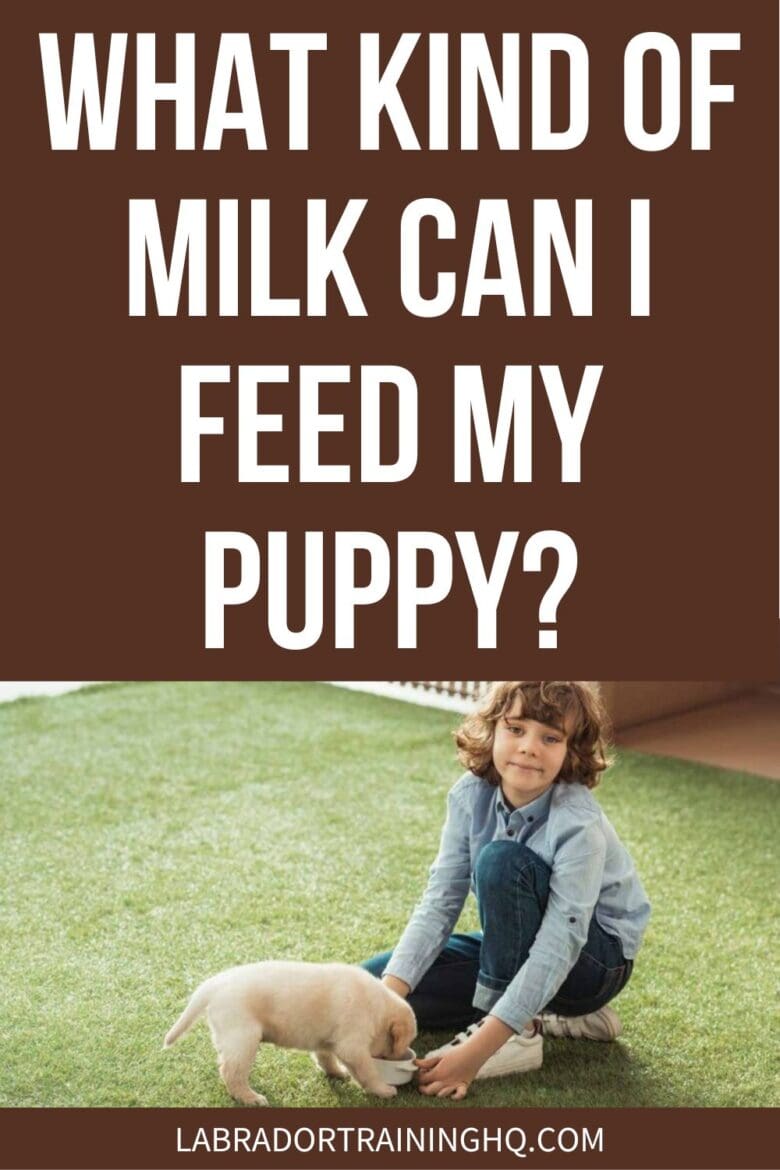
Top Picks For Our Dogs
- BEST PUPPY TOY
We Like: Calmeroos Puppy Toy w/ Heartbeat and Heat Packs - Perfect for new puppies. Helps ease anxiety in their new home. - BEST DOG CHEW
We Like: Bones & Chews Bully Sticks - All of our puppies love to bite, nip, and chew. We love using Bully Sticks to help divert these unwanted behaviors. - BEST DOG TREATS
We Like: Crazy Dog Train Me Treats - One of our favorite treats for training our service dog puppies. - BEST FRESH DOG FOOD
We Like: The Farmer's Dog - A couple months ago we started feeding Raven fresh dog food and she loves it! Get 50% off your first order of The Farmer's Dog.
For a list of all the supplies we get for our new service dog puppies check out our New Puppy Checklist on the PuppyInTraining.com blog.
